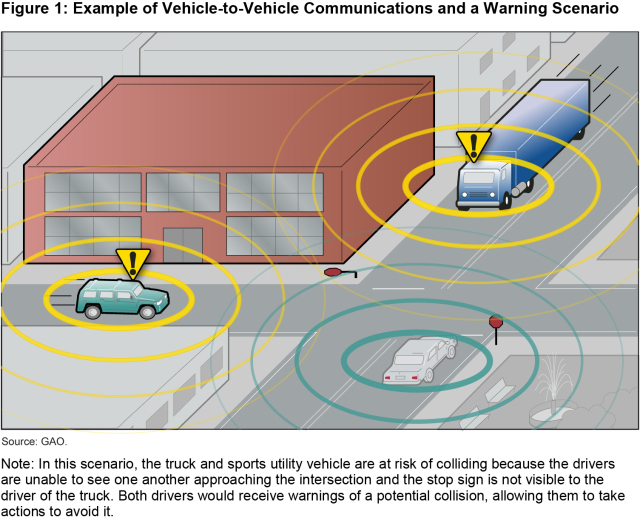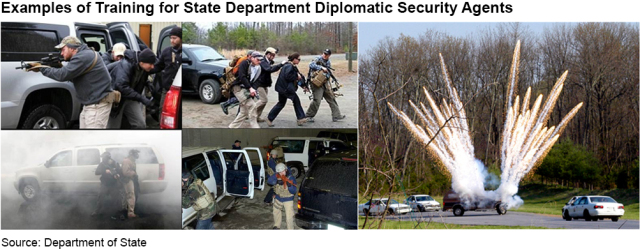The current golden age of prestige television has more in common with GAO’s work than you’d think—it turns out that Emmy-nominated TV shows, both comedies and dramas, worry about the same issues we do. Today’s WatchBlog explores how our work could help inform Hollywood about the safety, labor, and cybersecurity threats that make for such riveting TV.
Comedians in Cars…
A couple of distracted comedians driving classic cars while chatting and cracking jokes—what could possibly go wrong? Maybe the Emmy-nominated series,
Comedians in Cars Getting Coffee, should look into the safety benefits of cars with
Vehicle-to-Vehicle (V2V) safety technology.
 (Excerpted from GAO-14-13)
(Excerpted from GAO-14-13)
So, while Jerry Seinfeld chats with his friends on the way to the coffee shop,
V2V software applications could warn him of a potential crash through sounds, lights, or seat vibrations. And, since the federal government and car manufacturers are working to research and develop V2V communication-based technologies, maybe it will one day be sophisticated enough to give Seinfeld an alternate route to escape the paparazzi!
Silicon Valley
The comedy,
Silicon Valley (nominated for 11 Emmys), follows the creators of an IT startup company, Pied Piper, as they seek to join the internet billionaires’ club. Unfortunately, their unique programming skills are frustrated by the labor and financial vagaries of the high-tech business world. And, while no one at GAO is likely to become a Bay Area billionaire, we do
analyze the problems federal agencies face from not having enough skilled IT workers. We recently recommended that agencies improve the way they identify and correct these types of
critical skills gaps.
Pied Piper is also bedeviled by its arch nemesis, Gavin Belson, who repeatedly and underhandedly tries to steal their technology before it goes public. Federal agencies and the American public also face pervasive and sustained threats online (though not from greedy venture capitalists and tech moguls)—so GAO has been
reporting and
testifying on cybersecurity for years.
Homeland
Finally, Carrie and the cast of the Emmy-nominated
Homeland have survived kidnappings, motorcade ambushes, and embassies overrun by terrorists, among other things. U.S. personnel overseas face similar threats every day. So, how does the federal government protect them from the real-world violence portrayed in shows like
Homeland?
We’ve looked into the State Department’s efforts to secure diplomatic facilities and personnel overseas, and offered recommendations for improving security at
embassies and consulates, as well as at
residences, schools, and other potential targets.
 So…about that Emmy nod…
So…about that Emmy nod…
Just kidding, we don’t need an Emmy.
But if a screenwriter happens to be looking for inspiration for a new pilot, our recent reports on issues such as
conflict minerals,
military whistleblowers, and
protecting Syrian and Iraqi artifacts might help.
 (Excerpted from GAO-14-13)
(Excerpted from GAO-14-13) So…about that Emmy nod…
Just kidding, we don’t need an Emmy.
But if a screenwriter happens to be looking for inspiration for a new pilot, our recent reports on issues such as conflict minerals, military whistleblowers, and protecting Syrian and Iraqi artifacts might help.
So…about that Emmy nod…
Just kidding, we don’t need an Emmy.
But if a screenwriter happens to be looking for inspiration for a new pilot, our recent reports on issues such as conflict minerals, military whistleblowers, and protecting Syrian and Iraqi artifacts might help.

